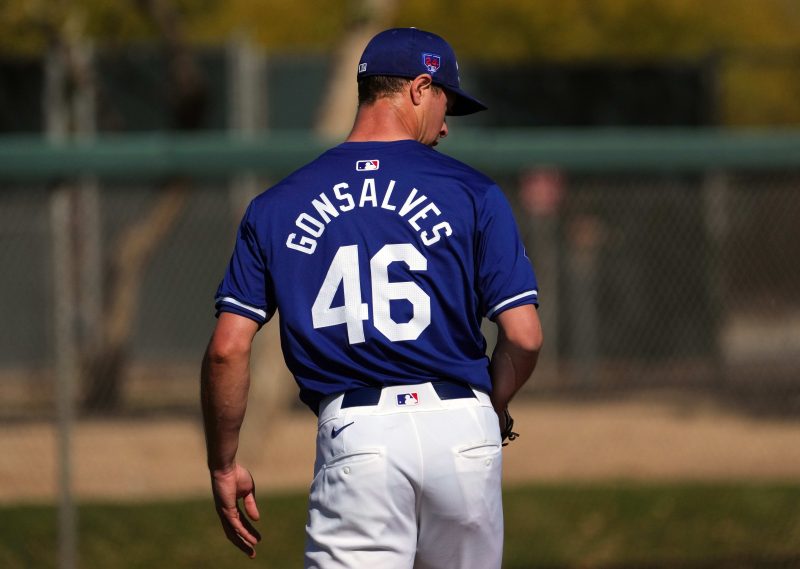CLEARWATER, Fla. – The jersey is almost like currency for a Major League Baseball player.
They toil for years to earn the right to wear one. They exchange tops with their pals or their idols after games, and perhaps give a little extra attention to a kid wearing a replica of the threads they put on day after day.
So it was no small moment Friday when veteran reliever Jeff Hoffman pulled on his freshly redesigned, Nike-stamped Philadelphia Phillies jersey for the first time, hours after MLB commissioner Rob Manfred deflected fan and player criticism of the togs.
It is, Manfred said, a “performance jersey,” trotted out at the 2023 All-Star Game to rave reviews for its lightness and comfort and noting that “everything (Nike) has done for us so far has been 100% successful.”
Well, score this one 50%.
HOT STOVE UPDATES: MLB free agency: Ranking and tracking the top players available.
Sure, Hoffman appreciated the jersey’s comfort, considerably lighter than its predecessor. But that’s just half the equation.
“Feel and look,” says Hoffman, “are two very different things.”
And let’s not mince words here: The jerseys look bad.
Oh, from a distance, and facing frontward, the differences aren’t apparent to the naked eye. Rather, it’s the back of the jerseys: The number and the lettering and the significant gap between the two that might as well be the Atlantic Ocean.
It’s somewhat akin to a Yankee fan buying an Aaron Judge or Derek Jeter shirsey or jersey with the player’s name on the back. Even a relatively lukewarm baseball fan knows Yankee jerseys do not have the name on the back.
The jersey, and by extension, the fan, look phony.
That’s the vibe this gear creates, an immediate feeling that something is not right, that the fan paid $25 for something cheap, rather than the $150 or more MLB, Nike and Fanatics, which produces the jerseys, expects them to pony up.
The problem is exacerbated based on the size and last name of the player.
With their full squad not due in camp until Monday, Phillies pitchers are the lone models for now, wearing the jerseys for their bullpen sessions. And if you’re 6-foot-2, 245-pound lefty Jose Alvarado, the ALVARADO on the back of the jersey reads more like alvarado.
Pity the fellows with brief last names. Reliever Kaleb Ort has just three letters in his name and hasn’t yet put on his jersey. He hadn’t noticed the diminutive lettering yet.
He’s now worried after a reporter pointed it out that perhaps he won’t be able to un-see it.
Where’s Mark GRUDZIELANEK or Marc RZEPCZYNSKI when you need them?
Alas, the checks have cleared, and the Nike-MLB partnership isn’t going away.
“We always pay attention to what people are saying about any new initiative,” Manfred said Thursday. “There’s going to be some negative feedback. First and most important, these are Nike jerseys. The jerseys are different. They are designed to be performance wear as opposed to what’s traditionally been worn.
“They have been tested more extensively than any jersey in any sport. The feedback from the All-Star Game last year where the jerseys were worn was uniformly positive from the players. I think when people wear them a little bit, they’re going to be really popular.”
With the players, on a 100-degree day in August, sure. Hoffman already feels the palpable lightness, likening them to “a T-shirt or a gym shirt.” He says they nailed his measurements, feels great.
But that name.
“It does look a little small. It does look a little worse,” he says. “My name is long enough. But that space (between number and name) looks huge.”
And that brings us to the fans. When jersey dispatches trickled in from camps in Florida and Arizona, #DHGate began trending on social media. Less discerning shoppers might think that referred to J.D. Martinez remaining unsigned into late February.
No, DHGate is an online shopping vendor that bills itself as a “Top-notch China Wholesale Marketplace.” And perhaps that’s not the association MLB, Nike and Fanatics imagined when they trotted these babies out.
It all wouldn’t be such a big deal if MLB did not correctly determine that attractive uniforms and alternate offerings were a fabulous way to connect with young fans. By and large, the ‘City Connect’ series has been a significant success, even if some of the more recent offerings lacked the pizzazz the first generation of alternate tops offered.
In short, the league’s apparel partner are failing them on this one.
Fan anger is fickle, of course. The most ardent tend to snap up anything new, almost sight unseen, if it involves their favorite team, player, sport, whatever.
But fans can always vote with their feet, and their wallets. We’ll know soon enough if they simply had to have the newest gear, even if the point size of the names is better suited for a T-baller.
Oh, well. The greater honor is earning the right to wear one, and even in this era of #DripChecks, the paycheck still wins out over sartorial splendor.
“I get to put on a big league uniform, still,” says Hoffman, 31. “There’s not much better than that.”

